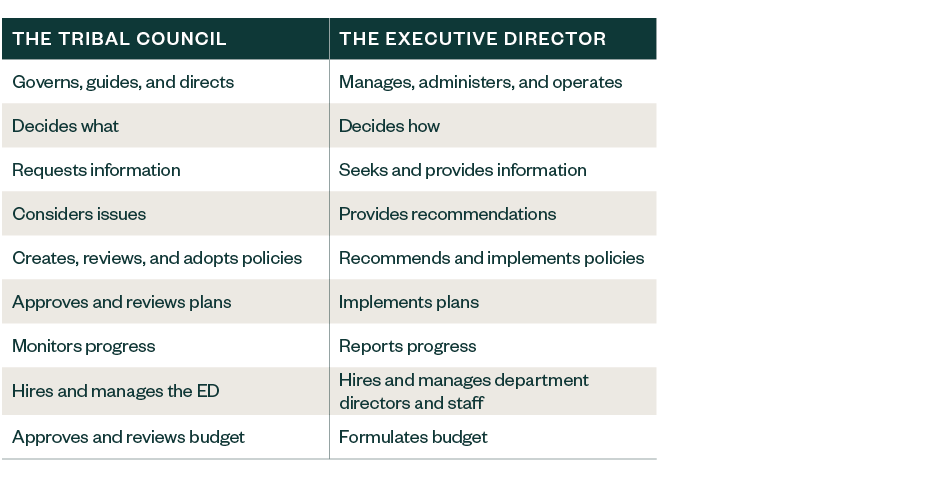
People elected to Tribal councils—sometimes called a board of directors or congress—often bring a wide range of skills, backgrounds, and viewpoints to the table.
However, newly elected officials often lack previous experience serving on a government council or other type of governance group. Without experience, it can be difficult to know what’s expected in the new role.
Below are key considerations for all Tribal council members—new or experienced—to keep in mind while working to serve their community.
Embrace the Tribal Council Role
Every Tribe defines the scope, authority, and responsibilities of the Tribal council differently, but there are generally four primary responsibilities.
Establish the Tribe’s Strategic Framework
Tribal councils typically help shape the Tribe’s strategic plan and select key strategic priorities for the Tribal government to focus on within the next one to five years.
Ensure Accountability
Tribal councils typically review reports, dashboards, and other data to ensure:
- Progress is being made toward strategic goals
- Services are provided to the community in an appropriate manner
- The Tribe’s financial position is sustainable
Provide Goodwill and Support to the Tribal Government
As leaders of the Tribal government, council members often represent the organization as a whole when building partnerships, seeking resources, or speaking with members of the Tribal community.
Set the Direction of the Tribal Government
Tribal councils typically manage the Tribe’s executive director (ED) and help them achieve specific goals and actions by working with the rest of the Tribal government department directors and staff.
There’s a distinction between governance, which involves guiding and directing activities at a strategic level, and management, which involves specific work. The following table shows the different roles and responsibilities between council members and the ED they oversee.
Roles of the Tribal Council Versus Executive Director

Build a Strong Relationship with the ED
One of the most important functions of a Tribal council is to select, support, manage, and evaluate the ED. In many Tribal governments, the council’s primary relationship to staff is through the ED. The council instructs the ED who, in turn, manages the staff. There can be rules prohibiting council members from contacting staff individually without the full vote of the council—each Tribe might have particular guidelines.
Regardless of the specific structure, maintaining a constructive and positive relationship with the ED is a key feature of high-performing councils.
Ideally, the chair or president should have regular check-ins with the ED and the whole council should be in consistent communication. Open communication channels will help build a strong working relationship and surface issues before they grow.
Understanding Your Governance Policies
Generally, Tribes establish specific constitutions, bylaws, charters, and regulations to establish authority and document rules related to how the Tribal council will function.
While each entity will have unique features, most high-functioning Tribal councils maintain the following governance-related policies and procedures, at a minimum:
- Code of conduct policy
- Conflict of interest policy
- Document retention and destruction policy
- Gift acceptance policy
- Nepotism policy
- Whistleblower policy
They also typically include Tribal council bylaws, which include information related to:
- Council authority
- Election protocol
- Position description and authority
- Meeting procedures
It’s particularly important to understand all policies related to ethics, especially for newer Tribal council members. New members should also prioritize reviewing any policies, procedures, or documentation that outline how council decisions are made—including information about topics like the agenda development process and voting etiquette. Typically, decision-related rules are documented, but if they aren’t, members should work with the ED to receive training.
If any of the baseline policies listed above are missing, it can be an opportunity to revisit how policies are developed and implemented.
Set the Tone at the Top
The work culture and norms that are established by an organization’s leadership team has a huge impact on how Tribal governments function.
If a Tribal council can successfully demonstrate respectful behavior, constructive conflict resolution, commitment to ethical boundaries, and professionalism, this behavior will be easier to reinforce throughout the government organization.
If senior leadership doesn’t model this type of productive behavior, it can create a toxic environment that’ll ultimately get in the way of achieving the organization’s mission and goals.
Council members should be aware of any behavior norms or codes of conduct that have been established for the group. In addition, focusing on mastering the following skills as a group can help establish strong and productive working relationships among council members:
- Demonstrate active teamwork
- Understand and excel at small group decision making
- Establish norms and processes to move through conflict in a healthy way
- Evaluate the Tribal council’s execution by performing self-assessments on an annual basis
Ultimately, Tribal council members are elected by their community to help the government move forward in a positive direction. To that end, council members’ actions and behavior must align with the expectations of your community members.
We’re Here to Help
To learn more about Tribal council member responsibilities and governance concepts, contact your Moss Adams professional.
You can also visit our Tribal & Gaming Practice.